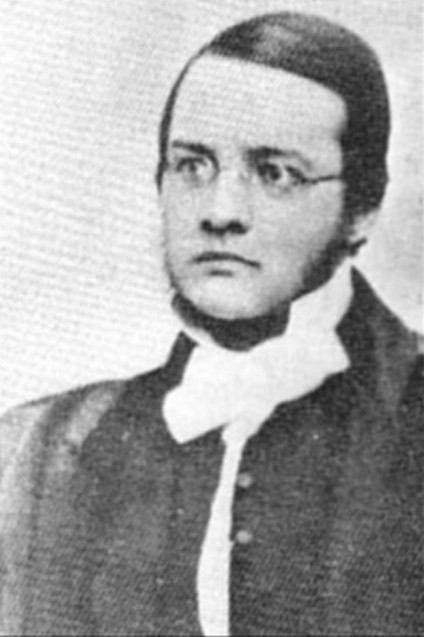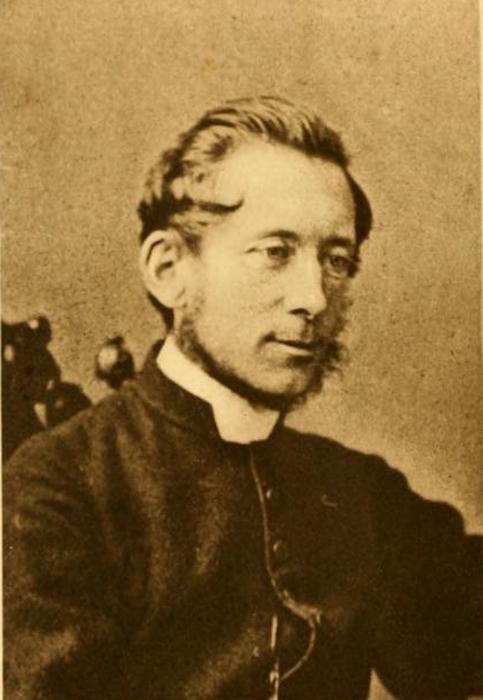
Stained glass window bearing text from the hymn at St Mary Magdalene, Sandringham [click to enlarge, and for more information].
Eternal Father, strong to save,
whose arm hath bound the restless wave,
who bidd'st the mighty ocean deep
its own appointed limits keep;
O hear us when we cry to Thee,
for those in peril on the sea!
O Christ, whose voice the waters heard
and hushed their raging at Thy word,
who walkedst on the foaming deep,
and calm amidst its rage didst sleep;
O hear us when we cry to thee,
for those in peril on the sea!
O Holy Spirit, who didst brood
upon the chaos dark and rude,
and bid its angry tumult cease,
and give, for wild confusion, peace;
O hear us when we cry to Thee,
for those in peril on the sea!
O Trinity of love and power,
our brethren shield in danger's hour;
from rock and tempest, fire and foe,
protect them wheresoe'er they go;
thus evermore shall rise to thee
glad hymns of praise from land and sea.

William Whiting. Source: Hymnary.org.
William Whiting (1825-1878) was born in Kensington, and educated at Clapham and Winchester College. A gifted musician, he became master of Winchester College Choristers' School. This is undoubtedly his most famous hymn. It was written in 1860, and is a translation from a Latin "triune litany," the first three stanzas addressing, in turn, the Father, Son and the Holy Ghost, and the last one calling upon the Trinity (see Brown and Butterworth 369-70). Written in 1860, it was printed in a revised version in the first edition of Hymns Ancient and Modern (1861). The story goes that it was written for a pupil at Winchester who was worried about his forthcoming voyage to America, but it may simply have been inspired by his own holiday experiences and perhaps especially by the bad storms of the previous year. Psalm 107 is also commonly cited as a source, especially the lines, "He maketh the storm a calm, so that the waves thereof are still" (v. 29). Whiting was fond of using imagery about the sea (see "Eternal Father").

John Bacchus Dykes. Source: frontispiece of Fowler.
Unlike some hymns which have alternative settings, this one is always sung to the tune of “Melita” (the old word for Malta, where St. Paul was shipwrecked). It was composed for the hymn by John Bacchus Dykes (1823-1876) in 1861. Dykes, the son of a shipbuilder in Hull, followed in his grandfather's footsteps rather than his father's: he was only twelve when he became assistant organist at St. John’s Church, Hull, where his grandfather was vicar. After being educated in Wakefield, Yorkshire, where the family moved in 1841 on his father's appointment as manager of the Wakefield and Barnsley Union Bank, Dykes entered St. Catharine’s Hall, Cambridge, where he founded and became president of the University's Musical Society. In 1848, after graduating with a BA in Classics, he became a curate at Malton, Yorkshire, then a canon of Durham Cathedral, and then, from 1849-62, precentor there. In 1862 he became vicar of St. Oswald’s, Durham, where he served for the rest of his life. During his career, he produced various religious writings, but kept up his interest in music, playing a variety of instruments himself, and composing over three hundred hymn tunes. Music was, as his biographer John Thomas Fowler explains, very much "a part of his religious life" (vi).
Dykes offered his compositions very humbly to the editors of the first Ancient and Modern hymnal:
During the autumn of 1860, Mr. Dykes first heard of the projected publication of the new hymn-book, to be called "Hymns Ancient and Modern," and at the request of some friends he wrote the following letter to Mr. Monk, the musical editor:—
Durham, Octr. 12th, 1860....You will I trust pardon the liberty I am taking, in addressing you, being personally a stranger to you.
I venture however at the request of Mr. Twells and also of Mr. Wilkins to send you a few MS. Tunes for your inspection, thinking it is possible that some of them might do for your forth-coming book. I may perhaps, in case I can find time, send one or two more to-morrow. Of course you will fully understand that you are not, in any sense whatever, bound to accept any one of the accompanying Tunes. I trust that in your responsible position of Musical Editor of the work, you will (in respect of them, as of all others) adopt none but such as you deem really worthy of admission.
I am sorry that I knew nothing of the musical arrangement of the work till just now. I should have felt so happy if I could have, either in the way of suggestion, or otherwise, rendered any little aid whatever to the musical committee. I understand that you are now in an advanced state of progress. However, I just send up these slight contributions, in case they may be of any service. [Fowler 71-72]
In fact, Dykes had composed music which perfectly brings out the subjects of the hymn, with the swell of the music echoing that of the sea, and the rise of the voices appealing to God for help. The last lines of the final stanza promise a paean of praise instead. In general, moreover, "its strong and easy chords and moderate note range are nobly suited to the devout hymn" (Brown and Butterworh 369). With his fine integration of thought, feeling and melody, Dykes is the best represented of all the composers in Hymns Ancient and Modern. Having been adopted by the navy both in Britain and America, "Eternal Father, Strong to Save" is one of Christendom's best-known hymns.
Note
In correspondence with the present author, George Peacock says that Brown and Butterworth were mistaken in thinking that the hymn was translated from the Latin. On the contrary, Whiting's own words were rendered into Latin: "When the hymn was first published in Hymns Ancient and Modern, it appeared in an adapted (and much improved) form, in which the order of the lines in, for example, the first verse were altered. It was there accompanied in a footnote by a translation into Latin, which followed the new line ordering.... it seems clear that Brown and Butterworth misunderstood the introduction to the footnote (which merely described it as a ‘Latin translation’)." See also (offsite) "Eternal Father, Strong to Save" in the Hymnology Archive. Many thanks for this clarification.
Links to Related Material
Bibliography
Brown, Theron, and Hezekiah Butterworth. The Story of the Hymns and Tunes. New York, 1906. Project Gutenberg version by Juliet Sutherland, David Wilson, and the Project Gutenberg Online Distributed Proofreading Team. Web. 10 February 2020.
"Eternal Father, Strong to Save." The Canterbury Dictionary of Hymnology. Web. 10 February 2020.
Fowler, John Thomas. Life and Letters of John Bacchus Dykes, MA, Mus.Doc, Vicar of St Oswald's, Durham. London: John Murray, 1897. Internet Archive. Contributed by Princeton Theological Library. Web. 10 February 2020.
Hymns Ancient & Modern, New Standard. Full Music Edition with Hymn Guide to the Three Year Lectionary, CLC 2000 (this is hymn no. 292).
Created 10 February 2020
Last modified (note added) 5 December 2024